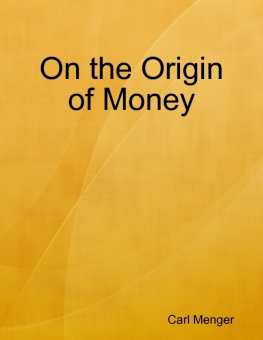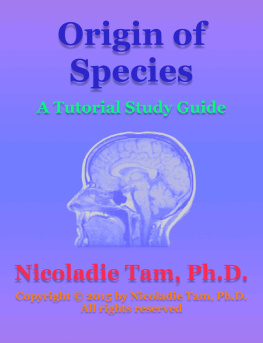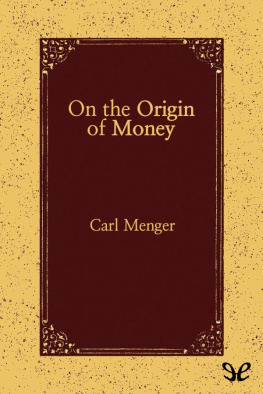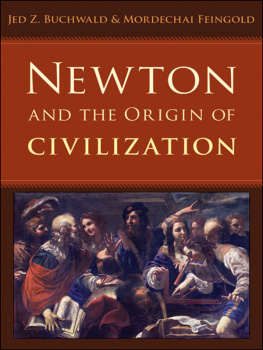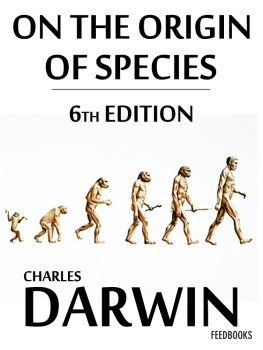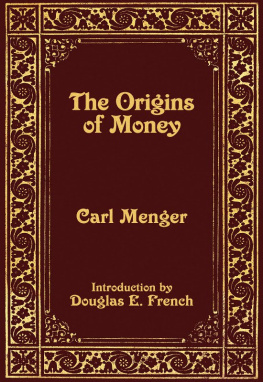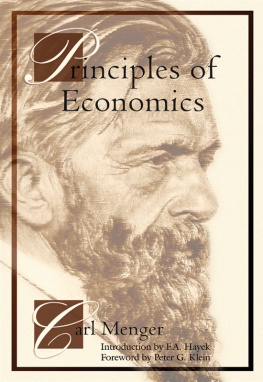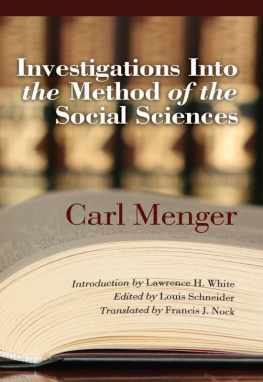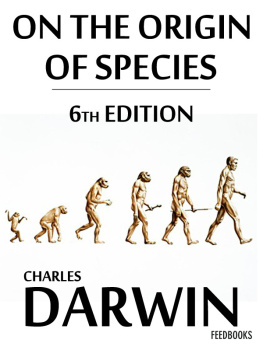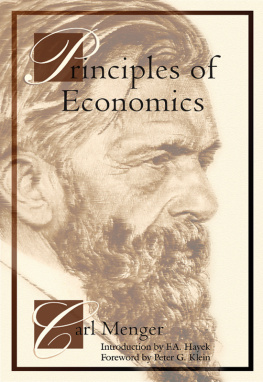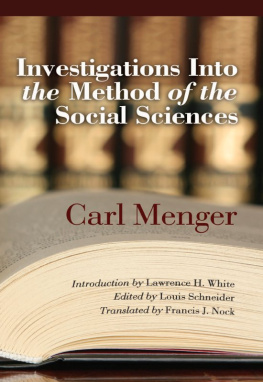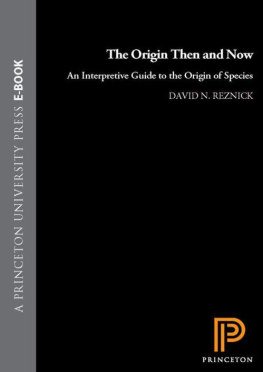Menger - On the Origin of Money
Here you can read online Menger - On the Origin of Money full text of the book (entire story) in english for free. Download pdf and epub, get meaning, cover and reviews about this ebook. year: 1995;2015, publisher: Lulu.com, genre: Science. Description of the work, (preface) as well as reviews are available. Best literature library LitArk.com created for fans of good reading and offers a wide selection of genres:
Romance novel
Science fiction
Adventure
Detective
Science
History
Home and family
Prose
Art
Politics
Computer
Non-fiction
Religion
Business
Children
Humor
Choose a favorite category and find really read worthwhile books. Enjoy immersion in the world of imagination, feel the emotions of the characters or learn something new for yourself, make an fascinating discovery.
On the Origin of Money: summary, description and annotation
We offer to read an annotation, description, summary or preface (depends on what the author of the book "On the Origin of Money" wrote himself). If you haven't found the necessary information about the book — write in the comments, we will try to find it.
On the Origin of Money — read online for free the complete book (whole text) full work
Below is the text of the book, divided by pages. System saving the place of the last page read, allows you to conveniently read the book "On the Origin of Money" online for free, without having to search again every time where you left off. Put a bookmark, and you can go to the page where you finished reading at any time.
Font size:
Interval:
Bookmark:
By
Carl Menger
1892
The Great Library Collection
By
R.P. Pryne
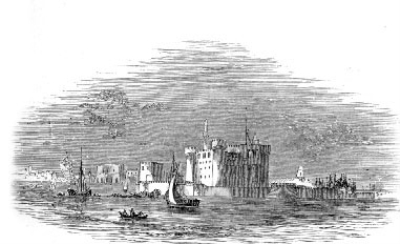
The degree to which a commodity is found by experience to command a sale, at a given market, at any time, at prices corresponding to the economic situation (economic prices), depends upon the following circumstances.
Upon the number of persons who are still in want of the commodity in question, and upon the extent and intensity of that want, which is unsupplied, or is constantly recurring.
Upon the purchasing power of those persons.
Upon the available quantity of the commodity in relation to the yet unsupplied (total) want of it.
Upon the divisibility of the commodity, and any other ways in which it may be adjusted to the needs of individual customers.
Upon the development of the market, and of speculation in particular. And finally,
Upon the number and nature of the limitations imposed politically and socially upon exchange and consumption with respect to the commodity in question.
We may proceed, in the same way in which we considered the degree of the saleableness in commodities at definite markets and definite points of time ,to set out the spatial and temporal limits of their saleableness . In these respects also we observe in our markets some commodities, the saleableness of which is almost unlimited by place or time, and others the sale of which is more or less limited.
The spatial limits of the saleableness of commodities are mainly conditioned
By the degree to which the want of the commodities is disturbed in space.
By the degree to which the goods lend themselves to transport ,and the cost of transport incurred in proportion to their value.
By the extent to which the means of transport and of commerce generally are developed with respect to different classes of commodities.
By the local extension of organised markets and their inter-communication by 'arbitrage'.
By the differences in the restrictions imposed upon commercial inter-communication with respect to different goods, to interlocal and, in particular, in international trade.
The time limits to the saleableness of commodities are mainly conditioned
By permanence in the need of them (their independence of fluctuation in the same).
Their durability, i.e. their suitableness for preservation.
The cost of preserving and storing them.
The rate of interest.
The periodicity of a market for the same.
The development of speculation and in particular of time-bargains in connection with the same.
The restrictions imposed politically and socially on their being transferred from one period of time to another.
All these circumstances, on which depend the different degrees of, and the different local and temporal limits to, the saleableness of commodities, explain why it is that certain commodities can be disposed of with ease and certainty in definite markets, i.e. within local and temporal limits, at any time and in practically any quantities, at prices corresponding to the general economic situation, while the saleableness of other commodities is confined within narrow spatial, and again, temporal, limits: and even within these the disposal of the commodities in question is difficult, and, in so far as the demand cannot be waited for, is not to be brought about without a more or less sensible diminution in price.
VI. On the Genesis of Media of Exchange
It has long been the subject of universal remark in centres of exchange, that for certain commodities there existed a greater, more constant, and more effective demand than for other commodities less desirable in certain respects, the former being such as correspond to a want on the part of those able and willing to traffic, which is at once universal and, by reason of the relative scarcity of the goods in question, always imperfectly satisfied. And further, that the person who wishes to acquire certain definite goods in exchange for his own is in a more favourable position, if he brings commodities of this kind to market, than if he visits the markets with goods which cannot display such advantages, or at least not in the same degree. Thus equipped he has the prospect of acquiring such goods as he finally wishes to obtain, not only with greater ease and security, but also, by reason of the steadier and more prevailing demand for his own commodities, at prices corresponding to the general economic situation at economic prices. Under these circumstances, when any one has brought goods not highly saleable to market, the idea uppermost in his mind is to exchange them, not only for such as he happens to be in need of, but, if this cannot be effected directly, for other goods also, which, while he did not want them himself, were nevertheless more saleable than his own. By so doing he certainly does not attain at once the final object of his trafficking, to wit, the acquisition of goods needful to himself. Yet he draws nearer to that object. By the devious way of a mediate exchange, he gains the prospect of accomplishing his purpose more surely and economically than if he had confined himself to direct exchange. Now in point of fact this seems everywhere to have been the case. Men have been led, with increasing knowledge of their individual interests, each by his own economic interests, without convention, without legal compulsion, nay, even without any regard to the common interest, to exchange goods destined for exchange (their "wares") for other goods equally destined for exchange, but more saleable.
With the extension of traffic in space and with the expansion over ever longer intervals of time of prevision for satisfying material needs, each individual would learn, from his own economic interests, to take good heed that he bartered his less saleable goods for those special commodities which displayed, beside the attraction of being highly saleable in the particular locality, a wide range of saleableness both in time and place. These wares would be qualified by their costliness, easy transportability, and fitness for preservation (in connection with the circumstance of their corresponding to a steady and widely distributed demand), to ensure to the possessor a power, not only 'here' and 'now' but as nearly as possible unlimited in space and time generally, over all other market-goods at economic prices.
And so it has come to pass, that as man became increasingly conversant with these economic advantages, mainly by an insight become traditional, and by the habit of economic action, those commodities, which relatively to both space and time are most saleable, have in every market become the wares, which it is not only in the interest of every one to accept in exchange for his own less saleable goods, but which also are those he actually does readily accept. And their superior saleableness depends only upon the relatively inferior saleableness of every other kind of commodity, by which alone they have been able to become generally acceptable media of exchange.
It is obvious how highly significant a factor is habit in the genesis of such generally serviceable means of exchange. It lies in the economic interest of each trafficking individual to exchange less saleable for more saleable commodities. But the willing acceptance of the medium of exchange presupposes already a knowledge of these interest on the part of those economic subjects who are expected to accept in exchange for their wares a commodity which in and by itself is perhaps entirely useless to them. It is certain that this knowledge never arises in every part of a nation at the same time. It is only in the first instance a limited number of economic subjects who will recognize the advantage in such procedure, an advantage which, in and by itself, is independent of the general recognition of a commodity as a medium of exchange, inasmuch as such an exchange, always and under all circumstances, brings the economic unit a good deal nearer to his goal, to the acquisition of useful things of which he really stands in need. But it is admitted, that there is no better method of enlightening any one about his economic interests than that he perceive the economic success of those who use the right means to secure their own. Hence it is also clear that nothing may have been so favourable to the genesis of a medium of exchange as the acceptance, on the part of the most discerning and capable economic subjects, for their own economic gain, and over a considerable period of time, of eminently saleable goods in preference to all others. In this way practice and a habit have certainly contributed not a little to cause goods, which were most saleable at any time, to be accepted not only by many, but finally by all, economic subjects in exchange for their less saleable goods; and not only so, but to be accepted from the first with the intention of exchanging them away again. Goods which had thus become generally acceptable media of exchange were called by the Germans Geld, from gelten , i.e. to pay, to perform, while other nations derived their designation for money mai nly from the substance used,
Font size:
Interval:
Bookmark:
Similar books «On the Origin of Money»
Look at similar books to On the Origin of Money. We have selected literature similar in name and meaning in the hope of providing readers with more options to find new, interesting, not yet read works.
Discussion, reviews of the book On the Origin of Money and just readers' own opinions. Leave your comments, write what you think about the work, its meaning or the main characters. Specify what exactly you liked and what you didn't like, and why you think so.

